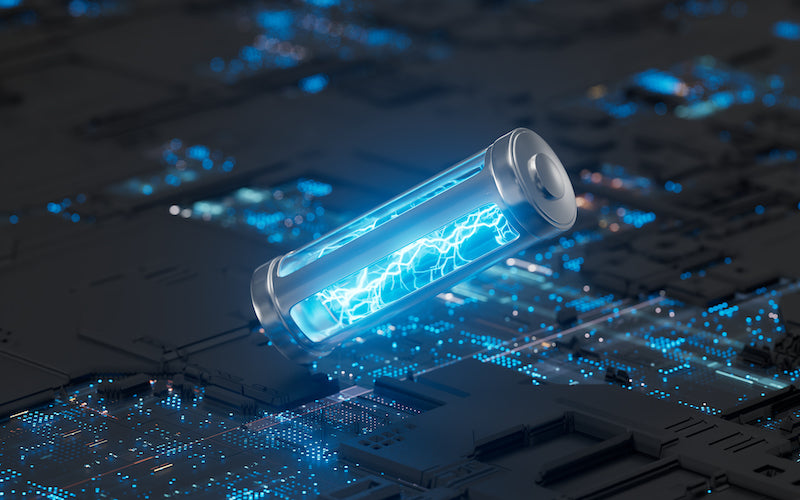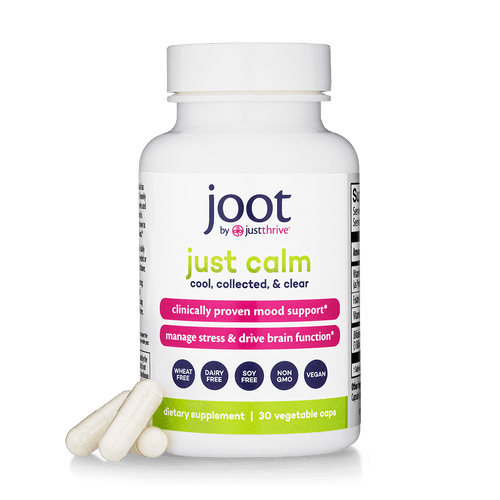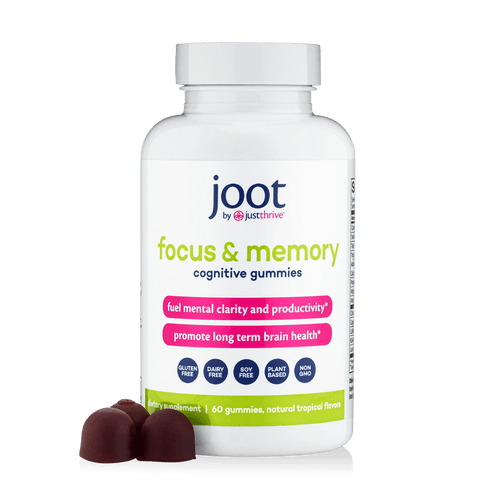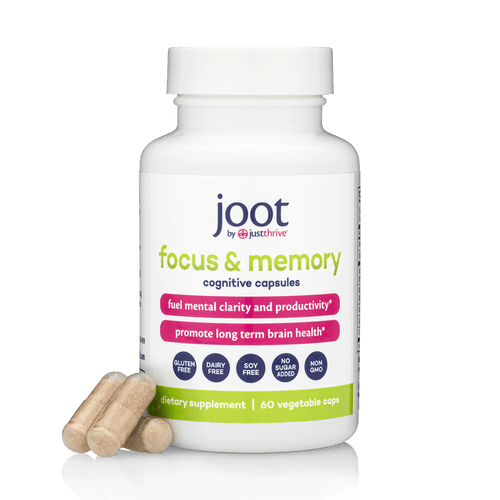Energizing your body’s power plants
Do you feel exhausted by mid-morning? Can’t make it through the day without needing to nap? Does completing a few tasks leave you feeling like you’re running on empty?
If you face every day feeling sluggish, drained, foggy, and weak it’s a clear sign that your body’s having an energy crisis. All the way down to the cellular level.
That means your cellular power plants—called mitochondria—are in desperate need of support. And you can’t feel awake, energized, or inspired until those mini batteries are fully charged.
Mitochondria Power You Up
Your energy supplies start down at the cellular level, where all the cells in your body contain their own miniature “power plants” called mitochondria. Every cell contains from hundreds to thousands of mitochondria, and the number depends on how much energy that cell needs to get its job done. For example, muscle cells have more mitochondria than skin cells.[1]
Your mitochondria take raw materials—glucose and oxygen—and convert them into energy. To keep you powered up, your mitochondria need a steady supply of oxygen, glucose, and nutrients—like B vitamins and selenium—that support energy creation.

That energy gets stored in special molecules called adenosine triphosphate (ATP). When the cell needs to use energy, ATP releases it from storage, sort of like hitting the ATM to get some cash out of savings.
But when any glitch occurs in this system, even a tiny blip, it can drain your vitality and motivation so you’re left feeling weak, foggy, and exhausted.
When Your Batteries Run Low
Healthy mitochondria keep you powered up all day, every day because your body uses energy 24/7 (yes, even while you sleep). But when mitochondria are damaged, your batteries drain and you feel like you need to power off.
Unfortunately, a lot of things can harm mitochondria and cause them to malfunction. Some of the worst culprits include:
- free radicals and oxidative stress[2]
- nutrient deficiencies including zinc, selenium, and vitamin D[3,4]
- common medications including acetaminophen, ibuprofen, and statins[5,6]
- viral infections[7]
Any of those can damage your mitochondria. And when your body’s batteries are glitching you can’t feel energetic, vital, and motivated. Worse, it can set you up for debilitating chronic conditions such as Parkinson’s, chronic fatigue syndrome, and cancer.[8] Sluggish mitochondria can even cause you to age prematurely.[6]
That’s why you need to do whatever you can to keep your batteries fully charged.

10 Ways to Support Your Mitochondria
Because they’re so important to your overall health and vitality, you’ll want to keep your mitochondria supplied with everything they need. A healthy, varied diet and regular exercise go a long way toward doing that. But for true support, you’ll want to make sure you’re meeting they’re very specific needs. These are the ten best ways to do that.
1. Antioxidants
When your mitochondria produce energy, they also create free radicals as a byproduct. Free radicals cause oxidative stress which can damage mitochondria; it’s one of their biggest threats.[2] So you need to make sure your body has enough antioxidants on board to keep those free radicals in check. You can bump up your antioxidant support through rich food sources like broccoli and beets, beneficial probiotic gut bacteria, minerals like zinc and selenium, or herbs like ashwagandha.
2. Spore Probiotics
Your gut microbiome, the trillions of bacteria in your gut, has a huge impact on your mitochondria.[9] A healthy gut contains mainly beneficial probiotic bacteria along with a few stray pathogens. Those beneficial bacteria produce essential compounds like short chain fatty acids that support cellular health. Spore probiotics help keep your gut microbiome in healthy balance… and some do even more for mitochondrial health. Bacillus indicus HU36™, a proprietary strain of spore probiotics, transforms your gut into an antioxidant factory. HU36 produces 15 powerfully protective antioxidants including astaxanthin, lycopene, lutein, and zeaxanthin right in your gut where your body can most easily absorb them and put them to work against free radicals.[10]
3. B Vitamins
B vitamins are critical for proper mitochondria function and energy creation.[11] In fact, B vitamins directly regulate mitochondrial metabolism.[12] When you don’t get enough of these essential nutrients, your mitochondria won’t work at full power.
4. Vitamin D3
You probably don’t get enough of the sunshine vitamin[13], and that can take a huge toll on your mitochondria. Vitamin D helps regulate cellular health, and that includes the mitochondria that power your cells. Having low levels of vitamin D leads to reduced mitochondria activity and increased oxidative stress throughout the body.[14] Your mitochondria need plenty of vitamin D on hand in order to produce enough energy.
5. Vitamin K2
Vitamin K2 is crucial for mitochondria function, repair, and survival. It helps protect against free radicals, contributes to the creation of new mitochondria, and helps regulate mitochondrial quality control and maintenance functions.[15]
6. Iron
Mitochondria store a lot of iron, up to 50% of the total amount in a cell.[17] These biological batteries use iron in several energy-producing functions, including transport. When mitochondria don’t have enough iron, it changes their size and shape which can lead to malfunctions.[16]
7. Selenium
Selenium plays an important role in protecting mitochondria against free radicals by acting as an inner antioxidant. This essential mineral also supports normal mitochondrial function.[17] Research shows that selenium increases the creation of new mitochondria as well as increasing mitochondrial respiratory capacity, their ability to produce extra energy even under stressful conditions.[18]
8. Zinc
Your mitochondria rely on zinc for energy transport and enzyme creation. The mineral also provides extra antioxidant protection against free radicals, and low levels of mitochondrial zinc can make the power plants more vulnerable to oxidative stress.[17] Zinc also promotes mitochondrial respiratory function—their ability to convert oxygen into energy.[19]
9. Ashwagandha
Ashwagandha is a powerful Ayurvedic herb that’s been used for thousands of years to boost health and longevity. It’s known to improve mitochondrial function and cellular energy use, especially in fat and muscle cells.[20]
10. CognatiQ®
Your brain burns through tons of energy every day, and its mitochondria need to keep up. They rely on a special protein called brain-derived neurotrophic factor (BDNF) to help manage their energy production cycles. Without enough BDNF, those mitochondria can’t fire up, leaving you feeling foggy and forgetful.[21] CognatiQ® is a stimulant-free compound extracted from coffee fruit that promotes BDNF. Research shows that a single 100 mg dose of CognatiQ® can increase BDNF by 143%[22], providing plenty of support for your mitochondria.
In Summary
You have a lot of choices when it comes to supporting your mitochondria – and the more you do, the better you’ll feel. While the best regimen would include all of these supports for total mitochondria health, any that you choose will make a difference. If you’d rather take it one step at a time, the best place to start is with your gut microbiome. A healthy gut full of beneficial probiotic bacteria offers foundational health benefits plus direct support and antioxidant protection for your body’s mini power plants.
Support Robust Mitochondria and Improved Energy with Just Thrive
Strong, healthy mitochondria mean more energy for every cell in your body. And that means more vitality, mental clarity, stamina, and strength for you.
Just Thrive offers mitochondrial support from every angle. You’ll find products packed with essential nutrients, powerful antioxidants, and clinically proven spore probiotics that deliver unmatched support for a healthy, balanced gut microbiome.
Just Thrive Probiotic & Antioxidant contains four proven spore probiotics to support a healthy, diverse gut microbiome and powered-up mitochondria. (Also comes in gummies!)
- Bacillus indicus HU36™ (the probiotic “antioxidant factory”)
- Bacillus subtilis HU58™
- Bacillus clausii
- Bacillus coagulans
Immunity Plus contains the supportive nutrients and botanicals you need for abundant wellness all year round. Each capsule of Immunity Plus contains:
- Selenium, a powerful antioxidant mineral that keeps your immune system going strong
- Zinc, an essential mineral necessary for proper mitochondrial function
- Echinacea, the preferred immune-supporting herb for generations
- Pomanox® Pomegranate Extract, which supplies 3x more polyphenols than red wine or green tea
- Epicor® postbiotic, shown in 8 human clinical trials to deliver significant support when you need it most
Just Calm supports effective stress management while promoting an overall sense of well-being. Just Calm contains Bifidobacterium longum 1714™, a heavily researched and scientifically verified probiotic that specifically supports brain health along with a mitochondria-supportive combination of nutrients:
- Vitamin B6
- Vitamin B9
- Vitamin B12
Vitamin K2-7 Plus D3 contains high potency forms of both vitamins: 200 mcg of K2-7 and 5000 IU of D3. This essential nutrient duo supports mitochondrial health and overall healthy longevity.
Focus and Memory delivers the gentle spark that supports mitochondria to keep your brain running on full power all day long. Focus and Memory contains a wealth of mental energy supportive ingredients including:
- CognatiQ®
- Vitamin B12
- Vitamin D3
- KSM-66® Ashwagandha root extract
- And more!
These beloved Just Thrive wellness heroes offer a treasure trove of support for mitochondria.
>> Charge up your cellular batteries today with Just Thrive!
Not sure if these Just Thrive products will work for you? We’re confident that you’ll notice a positive difference with all of our products including Just Thrive Probiotic & Antioxidant, Immunity Plus, Just Calm, Vitamin K2-7 Plus D3, and Focus and Memory.
But if you’re not 100% happy with any of our products, we’ve got your back.
At Just Thrive we offer you complete purchase protection, a 100% guarantee. If you’re not satisfied with your Just Thrive purchase for ANY reason, you can take advantage of our “Bottom of the Bottle” Money Back Guarantee:
Love your Just Thrive purchase, or request a full product refund at any time… Whether it’s 3 days, 3 weeks, or 3 months later… Even if the bottle is empty!
Sources
- Cooper GM. The Cell: A Molecular Approach. 2nd edition. Sunderland (MA): Sinauer Associates; 2000. Mitochondria. Available from: https://www.ncbi.nlm.nih.gov/books/NBK9896/
- Guo C, Sun L, Chen X, Zhang D. Oxidative stress, mitochondrial damage and neurodegenerative diseases. Neural Regen Res. 2013 Jul 25;8(21):2003-14.
- Bomer N, Pavez-Giani MG, Grote Beverborg N, Cleland JGF, van Veldhuisen DJ, van der Meer P. Micronutrient deficiencies in heart failure: Mitochondrial dysfunction as a common pathophysiological mechanism? J Intern Med. 2022 Jun;291(6):713-731. doi: 10.1111/joim.13456. Epub 2022 Feb 9. PMID: 35137472; PMCID: PMC9303299.
- Matta Reddy A, Iqbal M, Chopra H, Urmi S, Junapudi S, Bibi S, Kumar Gupta S, Nirmala Pangi V, Singh I, Abdel-Daim MM. Pivotal role of vitamin D in mitochondrial health, cardiac function, and human reproduction. EXCLI J. 2022 Jul 20;21:967-990. doi: 10.17179/excli2022-4935. PMID: 36110560; PMCID: PMC9441677.
- Neustadt J, Pieczenik SR. Medication-induced mitochondrial damage and disease. Mol Nutr Food Res. 2008 Jul;52(7):780-8. doi: 10.1002/mnfr.200700075. PMID: 18626887.
- Pizzorno J. Mitochondria-Fundamental to Life and Health. Integr Med (Encinitas). 2014 Apr;13(2):8-15.
- Elesela S, Lukacs NW. Role of Mitochondria in Viral Infections. Life (Basel). 2021 Mar 11;11(3):232. doi: 10.3390/life11030232. PMID: 33799853; PMCID: PMC7998235.
- Casanova A, Wevers A, Navarro-Ledesma S, Pruimboom L. Mitochondria: It is all about energy. Front Physiol. 2023 Apr 25;14:1114231.
- Zhu Y, Li Y, Zhang Q, Song Y, Wang L, Zhu Z. Interactions Between Intestinal Microbiota and Neural Mitochondria: A New Perspective on Communicating Pathway From Gut to Brain. Front Microbiol. 2022 Feb 24;13:798917. doi: 10.3389/fmicb.2022.798917. PMID: 35283843; PMCID: PMC8908256.
- Sy C, Dangles O, Borel P, Caris-Veyrat C. Interactions between Carotenoids from Marine Bacteria and Other Micronutrients: Impact on Stability and Antioxidant Activity. Mar Drugs. 2015 Nov 19;13(11):7020-39.
- Sandip Mukherjee, Oly Banerjee, Siddhartha Singh. Metabolic Deficits, Whole-Diet Interventions, and Targeted Nutraceuticals. 2023, Pages 167-193
- Janssen JJE, Grefte S, Keijer J, de Boer VCJ. Mito-Nuclear Communication by Mitochondrial Metabolites and Its Regulation by B-Vitamins. Front Physiol. 2019 Feb 12;10:78.
- Sizar O, Khare S, Goyal A, et al. Vitamin D Deficiency. [Updated 2023 Jul 17]. In: StatPearls [Internet]. Treasure Island (FL): StatPearls Publishing; 2024 Jan-. Available from: https://www.ncbi.nlm.nih.gov/books/NBK532266/
- Matta Reddy A, Iqbal M, Chopra H, Urmi S, Junapudi S, Bibi S, Kumar Gupta S, Nirmala Pangi V, Singh I, Abdel-Daim MM. Pivotal role of vitamin D in mitochondrial health, cardiac function, and human reproduction. EXCLI J. 2022 Jul 20;21:967-990.
- Tang H, Zheng Z, Wang H, Wang L, Zhao G, Wang P. Vitamin K2 Modulates Mitochondrial Dysfunction Induced by 6-Hydroxydopamine in SH-SY5Y Cells via Mitochondrial Quality-Control Loop. Nutrients. 2022 Apr 4;14(7):1504.
- Paul BT, Manz DH, Torti FM, Torti SV. Mitochondria and Iron: current questions. Expert Rev Hematol. 2017 Jan;10(1):65-79.
- Killilea D and Killilea A., Mineral requirements for mitochondrial function: A connection to redox balance and cellular differentiation. Free Radical Biology and Medicine. Volume 182, March 2022, Pages 182-191.
- Wesolowski LT, Semanchik PL, White-Springer SH. Beyond antioxidants: Selenium and skeletal muscle mitochondria. Front Vet Sci. 2022 Dec 1;9:1011159.
- Zhang G, Sheng M, Wang J, Teng T, Sun Y, Yang Q, Xu Z. Zinc improves mitochondrial respiratory function and prevents mitochondrial ROS generation at reperfusion by phosphorylating STAT3 at Ser727. J Mol Cell Cardiol. 2018 May;118:169-182.
- Lee DH, Ahn J, Jang YJ, Seo HD, Ha TY, Kim MJ, Huh YH, Jung CH. Withania somnifera Extract Enhances Energy Expenditure via Improving Mitochondrial Function in Adipose Tissue and Skeletal Muscle. Nutrients. 2020 Feb 7;12(2):431.
- Swain M, K Soman S, Tapia K, Dagda RY, Dagda RK. Brain-derived neurotrophic factor protects neurons by stimulating mitochondrial function through protein kinase A. J Neurochem. 2023 Oct;167(1):104-125.
- Reyes-Izquierdo T, Nemzer B, Shu C, Huynh L, Argumedo R, Keller R, Pietrzkowski Z. Modulatory effect of coffee fruit extract on plasma levels of brain-derived neurotrophic factor in healthy subjects. Br J Nutr. 2013 Aug 28;110(3):420-5.














